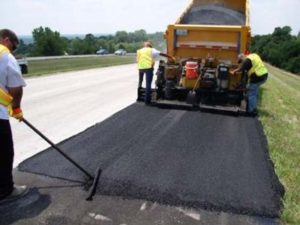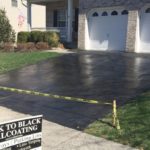Asphalt – How Thick Should It Be?
 Asphalt pavements are an engineered mixture of aggregate (stones and sand) with liquid asphalt cement (a petroleum product). Varying sizes of aggregates are heated, then mixed, in exact proportions, with asphalt cement that has been liquefied at about 300°F. While the mixture is still hot, it is delivered to your property and placed on a prepared base or subgrade. Very soon after paving, the mixture cools and hardens so that you can drive and park on it right away.
Asphalt pavements are an engineered mixture of aggregate (stones and sand) with liquid asphalt cement (a petroleum product). Varying sizes of aggregates are heated, then mixed, in exact proportions, with asphalt cement that has been liquefied at about 300°F. While the mixture is still hot, it is delivered to your property and placed on a prepared base or subgrade. Very soon after paving, the mixture cools and hardens so that you can drive and park on it right away.
Asphalt driveways can also be designed using porous asphalt, a special asphalt mix that allows water to drain through the pavement into a subgrade reservoir. Porous asphalt can often be used to meet local impermeable surfaces codes and they offer a good-looking surface that is easy to maintain.
The application of asphalt in the pavement and driveway projects are varied.Asphalt mixtures come in a wide variety of designs. Some mixtures are smoother on top than others; some have a higher content of asphalt cement than others. It depends on the function of the driveway of the areas as well as the regulation and soil condition. The driveway for the high traffic, it will be a different requirement for a driveway in the residential areas. Furthermore, asphalt driveway thickness depends on the soil that’s being paved on and the industry standards of the region.
In Denver Colorado, for example, there are two types of soils. The first, on the front range, the soils tend to be expansive soils so most contractors excavate and install 3″ to 6″ inches of road base and then install 3” of compacted hot asphalt. To do this amount of work is normally within 1 to 2 days period.
Whereas in the mountains just west of Denver however, the soil is decomposed granite which is almost identical to that of a structural road base. In this situation, not need to ask for a better sub-grade so most contractors don’t install road base and pave 3″ of compacted hot asphalt. Usually, this can be done in one mobilization and in the same day.
In other parts of the country, for instance like Kentucky, the standard practice is to excavate and install 6″ of base, wait for 2 to 3 weeks and then return and install 2″ of compacted hot asphalt.
Full-Depth Asphalt: The Best Option
Full-depth asphalt driveways are built entirely of asphalt paving mixture — from the soil subgrade up. Full-depth driveways keep water out of the pavement, so water never enters the pavement to swell when it freezes. Full-depth asphalt provides a better balance of strength and flexibility — plus durability — than any other material. For improved soil stability, it is recommended that topsoil containing clay be removed or modified. Soil stabilization or as much as 6 inches of the crushed aggregate base may be required for some subgrade conditions. Both the subgrade and aggregate base require thorough compaction to provide a solid foundation for your new driveway. Once the site is ready, paving with asphalt follows. In many cases, a 4-inch thickness may be adequate, but 5 or even 6 inches of full-depth asphalt will assure you of a stronger, stable driveway under a wider range of climate and loads. As an option, some contractors use 6 to 8 inches of compacted aggregate, or gravel, as a base for 3 inches of asphalt pavement.
When it comes to the residential driveway, it has nothing more than everyday passenger vehicles driving on them. However, if any delivery trucks, trash collecting trucks or any other large commercial vehicles will pass on the driveway on a regular basis, it is essential to make sure that the contractor for the driveway project knows this important information. If it’s at all possible, it is highly recommended to try and eliminate the need for these vehicles driving on the residential asphalt driveway. These heavy vehicles can cause severe damage very fast or over time.
Now the only way to ensure the right thickness of base and asphalt for the soil type is to hire a soil engineer to evaluate the soil and come up with a pavement design for that is suitable with the soil condition. However, that can multiply the price of an asphalt driveway by three times! Even still there’s no guarantee that it won’t crack! The reputable contractors in will know what the proper thickness the asphalt should be for the driveway.
Contact us
 Phone Call |
 Text Message |
 |







